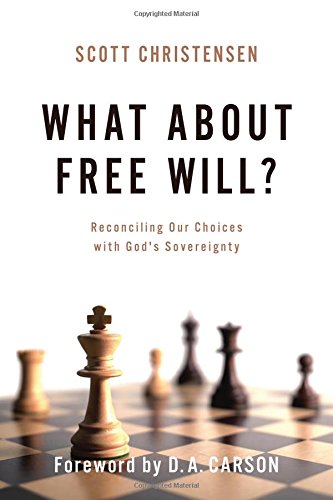A Brief Book Summary from Books At a Glance
About the Author
Scott Christensen has a degree from the Master’s Seminary and is the pastor of Summit Lake Community Church in Mancos, California.
Introduction
This book examines the subject of free will from a biblical perspective. The book is not written as a treatise in academic philosophy or theology, but it is informed about the scholarly issues that are involved in the discussion. Biblical data is placed as the highest authority, but the discussion also seeks to be logically cogent and coherent. Christensen argues that a Reformed understanding of compatibilism is what makes the most sense out of the biblical material, and it is also what makes the most logical sense in terms of rational analysis. He argues that libertarian definitions of freedom fail both biblically and philosophically.
Table of Contents
Introduction: The Free-Will Problem
Chapter 1 A Road Map for Libertarianism
Chapter 2 Assessing the Whys of Libertarianism
Chapter 3 How Big is Your God?
Chapter 4 A Road Map for Compatibilism
Chapter 5 A Dual Explanation for Why Good Stuff Happens
Chapter 6 A Dual Explanation for Why Bad Stuff Happens
Chapter 7 To Be Free or Not to Be Free
Chapter 8 Why We Do the Things We Do
Chapter 9 A Tale of Two Natures
Chapter 10 Exploring Corridors
Chapter 11 Navigating the New Nature
Chapter 12 Absolute Freedom
Appendices
Summary
Chapter 1
A Road Map for Libertarianism
Incompatibilists maintain that human freedom and responsibility are incompatible with determinism. Libertarianism is an incompatibilist position that denies that human choices are generated by deterministic processes. Compatibilists—in contrast to incompatibilists—believe that some types of freedom are compatible with some types of determinism. Although there are lots of nuances in each view, libertarian free will consists of two key concepts. The first key concept is the power of contrary choice: when we choose to do one thing, we could have chosen differently. The second key concept is that the responsible agent is solely responsible for the choices that they make. There can be no causal factors that determine the choice—theagent’s will is what generates the choice, and the agent could have chosen differently. Reasons and external or internal factors may influence the choice, but they do not act coercively to determine the outcome. There may be certain conditions that are necessary for us to make a particular choice, but the necessary conditions are never sufficient conditions that guarantee that one particular choice will be made: only our will’s choosing is the sufficient condition for the choice.
Click here to listen to the audio of this summary.
An entailment of libertarianism is that the future is open to many different possibilities. Many factors will influence our decisions, but at the time of choice, nothing constrains us to one particular option. Arminians are libertarians, and they believe that God does not act to determine human choices. The influence of God is necessary for receiving Christ, but it is not sufficient. Arminians believe that if God can determine our choices, then we are coerced rather than free or responsible. Christian libertarians often appeal to biblical texts that invite, command, warn, and otherwise tell people to make right choices and to avoid evil. God desires all people to repent and know him, yet for Arminians this desire is frustrated because God will not overrule human freedom.
Chapter 2
Assessing the Whys of Libertarianism
Libertarians insist that our choices are not causally determined, but if no sufficient explanation can be given for our choices, how are we responsible for them? Libertarians cannot explain why we choose what we choose, making it very hard to differentiate our choosing from an arbitrary, chance event that happens in us. Arminians claim that only by having libertarian freedom can we have a meaningful relationship with God. They claim that we must be able to hate or love God in order to really choose to love him. But this fails to see that love is given freely when our hearts are drawn to the beloved. In heaven we will love God without any alternative possibility of hating him. Furthermore, in God’s own intra-trinitarian relationships, the divine persons love each other perfectly, but they are not free to hate each other. On our own we are not free to love God because we are rebels who hate him. God’s irresistible grace is what frees us to love him.
Libertarians argue that their view of freedom is necessary for moral responsibility. We can only praise or blame people for their choices if their choices were undetermined. This view fails to take into account the fact that people are praiseworthy or blameworthy when they make moral choices out of their heart’s character. If someone is really indifferent in their will about choosing between good and evil—and they could just as easily incline the other way given the same set of circumstances—their choice is simply arbitrary, and therefore neither to be praised nor condemned. The Bible says that God judges us for our motives and intentions, not our ability to do otherwise. It also teaches that we are slaves to sin and are condemned because our hearts are sinful, rather than saying we are guilty because we abused the freedom of contrary choice. Nobody is able to meet God’s perfect standards, yet they are judged by them. Neither is God able to sin, yet he is praised.
Perhaps the strongest Arminian argument is that if God controls all things then…
[To continue reading this summary, please see below....]The remainder of this article is premium content. Become a member to continue reading.
Already have an account? Sign In
